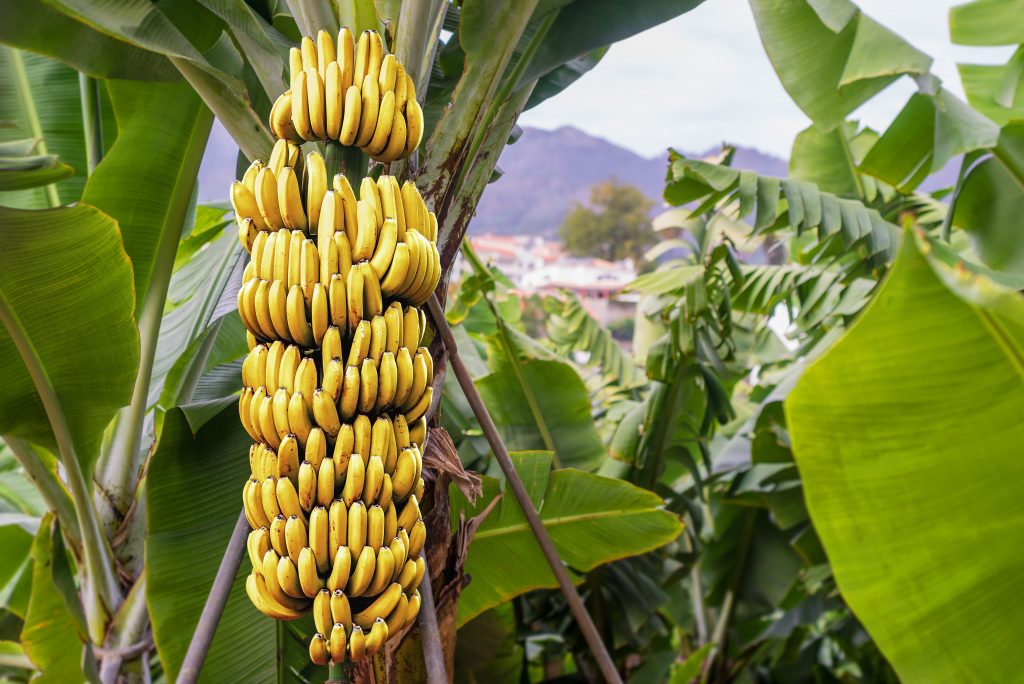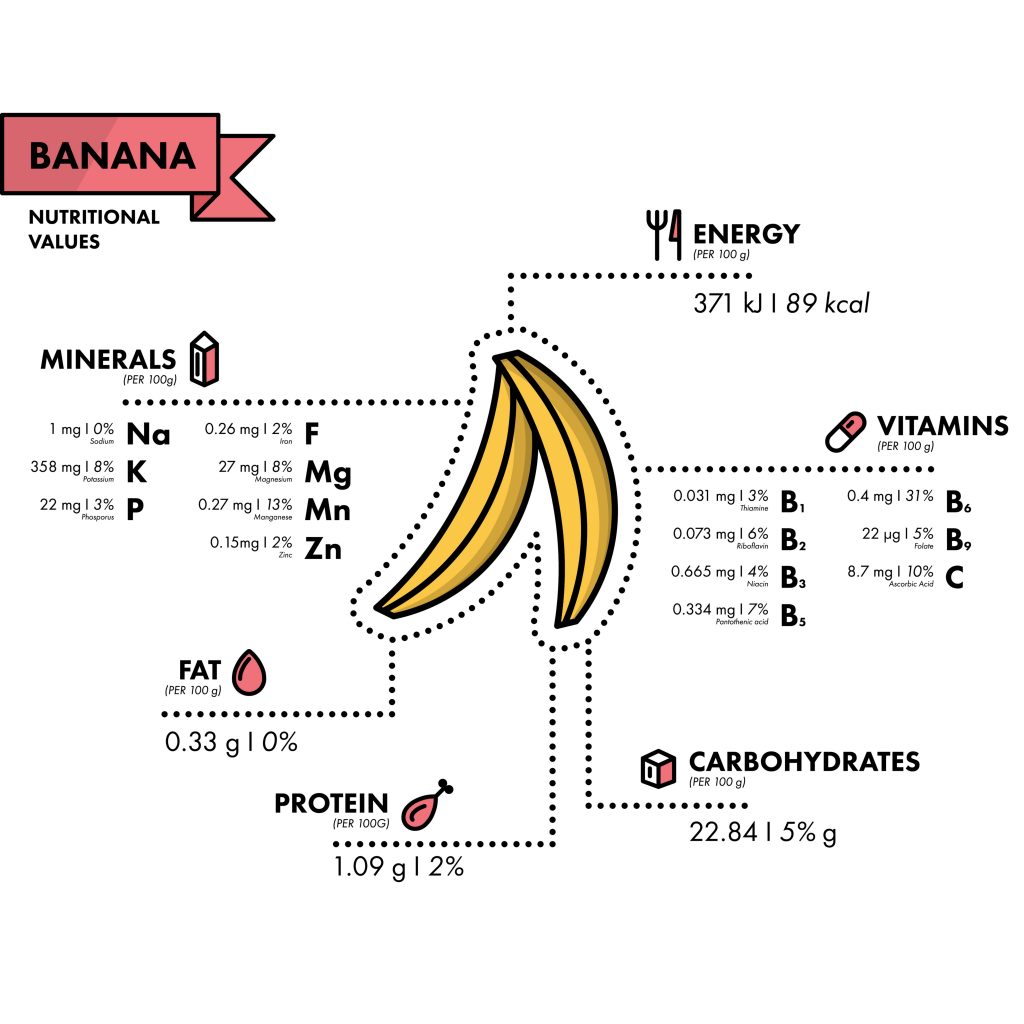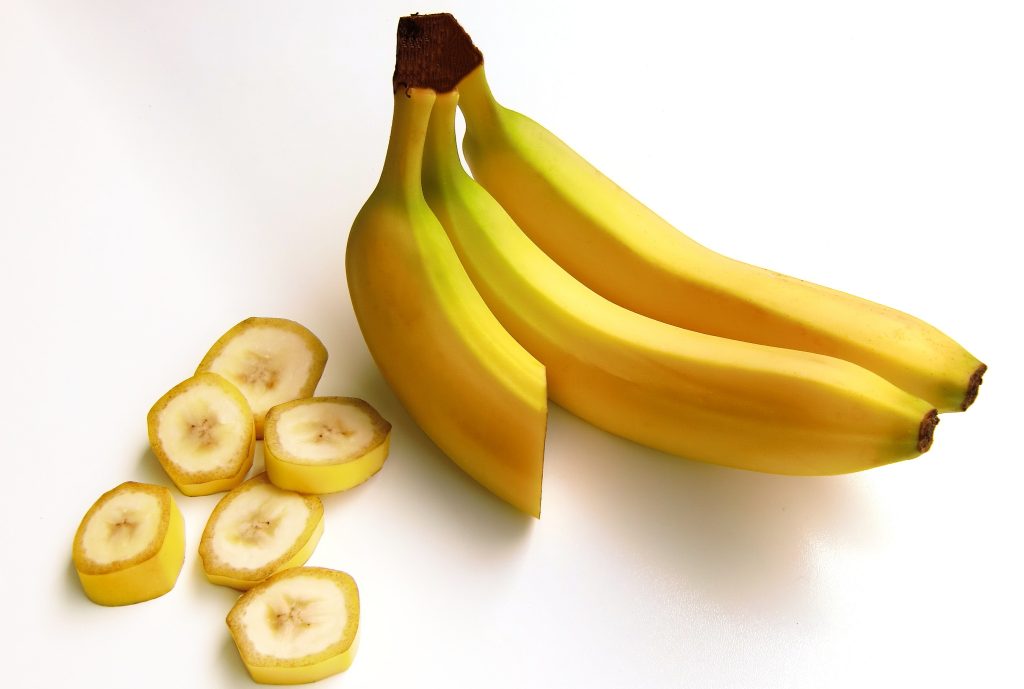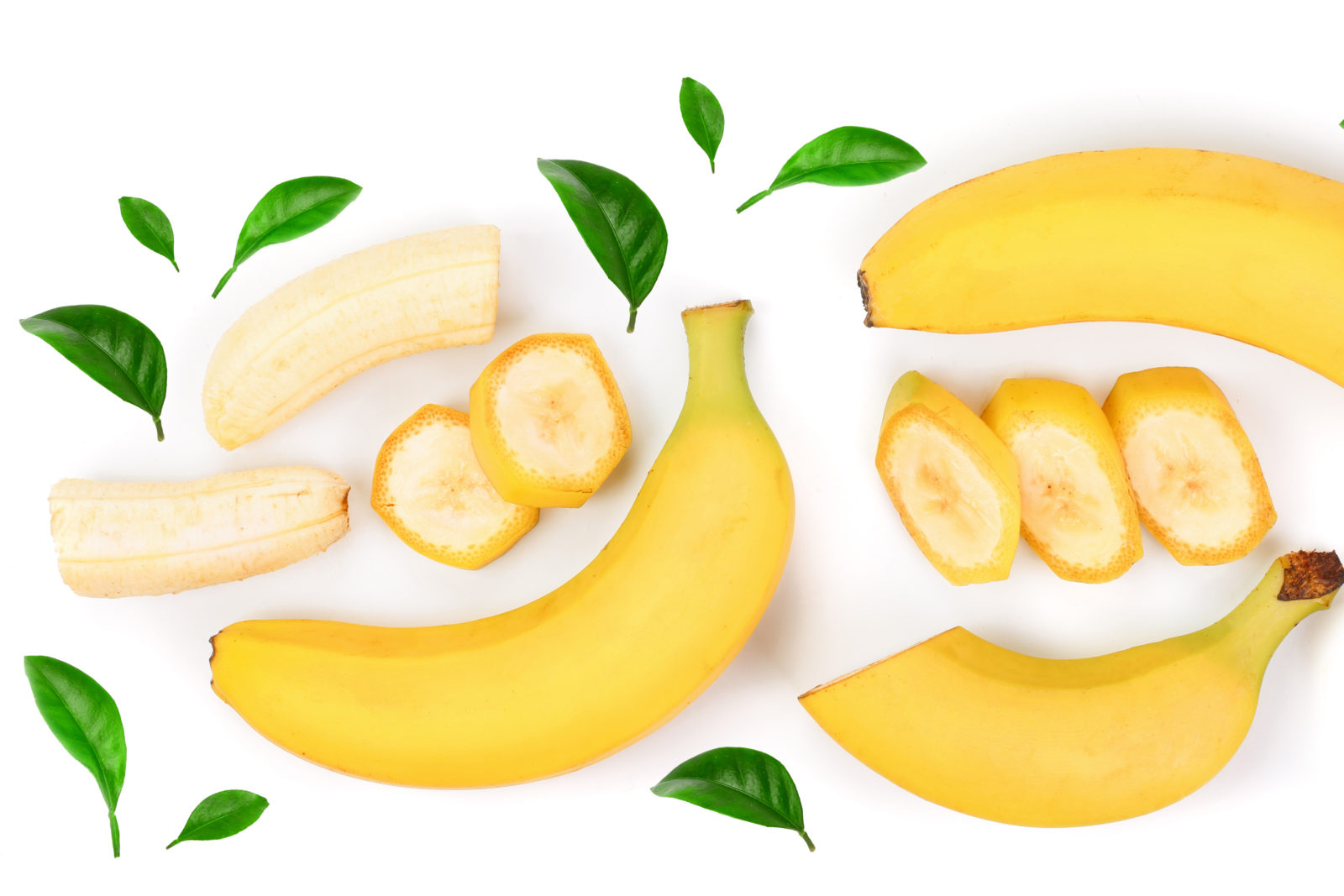The banana is one of the first plants domesticated by humans and today it is the second most-consumed fruit after tomatoes. Technically regarded as a berry, it is part of the Musa genus which contains about 70 species and subspecies, including over 1000 various bananas and plantains. A sweet treat develops its sugars as it ripens, from starch to fructose, sucrose, and glucose. Bananas are an excellent source of vitamin B6 and potassium, as well as containing adequate amounts of vitamin C, riboflavin, folic acid, and magnesium.
Nutrients in Bananas
Bananas may be a sweet treat but they are filled with tones of necessary nutrients. Bananas are the perfect snack, packed in their banana peel they don’t require any packaging with is also beneficial for the planet. As the banana ripens it becomes more digestible and richer in nutrients. Therefore to obtain the most nutrients it is important to consume ripe bananas.
One Medium-Sized Banana (118 grams) includes;
Energy (kcal) – 105
Protein – 1.29 grams
Fiber – 3.1 grams
Sugar 14.43 grams
Top Nutrients present in a ripe raw banana include;
- Magnesium – 32 mg
- Phosphorus – 26 mg
- Potassium – 422 mg
- Folate – 24 mg
- Vitamin C – 10.3 mg

Health Benefits
Bananas are much more than a delicious and sweet treat, they are a powerhouse of nutrients which provides them with wonderful health benefits. If you still need a reason as to why you must include bananas in your diet here are a few incredible benefits of eating bananas;
- Preventing anxiety and depression
- Improving digestive health
- Increasing energy and promoting recovery
- Kidney health
- Boosting the immune system
- Promoting heart health
- Reducing stress
- Healing ulcers
Preventing Anxiety and Depression
Bananas have been shown to aid in reducing depression as they contain tryptophan, an amino acid that builds proteins. Tryptophan helps in the production of serotonin, a neurotransmitter, that has a soothing effect on the brain, thus acting like a mild sedative that leads to an improved mood. Low levels of serotonin have been attributed to depression and anxiety.
Bananas are also very rich in tyrosine, which synthesizes dopamine. Dopamine, another neurotransmitter, helps nerve impulses within the brain cross the tiny gap between nerve cells. Low levels of dopamine have been associated with depression. Consuming bananas will aid in increasing dopamine levels in the brain and leave you feeling mentally well (ed. Verma, A.K., 2017).
Bananas and Stress
They also provide relief from stress. During high stress, the potassium levels in the body tend to deplete. Thus, eating bananas helps to rebalance the potassium levels naturally without using drugs. This is possible because they contain high amounts of potassium which helps to regulate the water balance in the body and helps to normalize the heartbeat (Vu, H.T., et al., 2018) (Pereira, A., et al., 2015).
Digestive Health – Preventing Diarrhea and Constipation
Bananas contain nondigestible fiber, a combination of cellulose, hemicellulose, and alpha-glucans. This assists in smooth bowel movement. Diarrhea usually causes depletion of important electrolytes from the body, especially potassium. Bananas contain high amounts of potassium and also pectin, a soluble fiber, both of which help normalize the movement through your digestive system. They are a mild laxative, a cure for both constipation and diarrhea (Kumar, K.P.S., et al., 2012).
Bananas contain exceptionally high amounts of certain compounds such as Fructo-oligosaccharide and SCFAs (Short Chain Fatty Acids). Fructo-oligosaccharide nourishes the probiotic bacteria and thereby boosts its function and increases its numbers inside the colon. This bacterium produces enzymes that increase the digestive ability, the body’s ability for the absorption of Calcium, and protects the body from the infections caused by unhealthy and harmful bacteria. SCFAs help to increase the body’s ability to absorb Calcium more efficiently.
Bananas offer a natural antacid effect inside the body. Thus, people suffering from heartburn can eat this fruit as it provides soothing relief. They reduce irritation and acidity by stimulating the cells on the internal lining of the stomach. This stimulation produces thicker mucus that protects against the acid. They contain protease inhibitors which help to inhibit bacteria inside the stomach as these bacteria are the primary cause of ulcer development.
Bananas help with Ulcers
Regular consumption of banana aids ulcer patients as it has an antibacterial substance that may inhibit the growth of ulcer-causing H. pylori bacteria. Pectin and vitamin C in a banana is effective in healing the damaged digestive system faster. The high amount of serotonin found in bananas neutralizes the excess amounts of hydrochloric acid discharge and soothes the uneasiness (Kumar, K.P.S., et al., 2012).
Unripe plantains have traditionally been used as a treatment for ulcers, not only are they beneficial at reducing ulcer pain, particularly from gastric juices, they also aid in healing the ulcers. Plantains and bananas alike aid in building up a mucosal layer or coating, decreasing cell shedding, leakage and increasing the rate of ulcer healing (Chatterjee, A., et al., 2014).
Increasing Energy and Promoting Recovery
Your body requires energy and it is supplied through the diet which contains sugars. Bananas contain three types of natural and healthy sugars which include glucose, sucrose, and fructose. Thus, one can get enough energy by eating a banana.
They work great for treating cramps as they contain high levels of potassium. By eating them, your body can expand and contract more freely. This is particularly important for athletes.
Ingestion of banana during and post-exercise is an effective way of reducing inflammation within the body. Banana metabolites function similarly to that of aspirin or ibuprofen – in terms of their ability to diminish inflammation. Bananas also increase mitochondrial respiration. All this makes bananas a perfect alternative to conventional sugary sports beverages during heavy exertion as an effective strategy to improve metabolic recovery and reducing post-exercise inflammation at the cellular level (Nieman, D.C., et al., 2018) (Reid, K., 2013).

Bananas and Kidney Health
Bananas potassium content aids in preventing and minimizing the potential for kidney stones. It reduces the risk of developing kidney cancer. This is because the fruits and vegetables contain certain compounds – cabbage is very rich in sulfur and bananas contain high amounts of phenolic compounds that help in effective detoxification of the potential carcinogens. The potassium present in this fruit helps in suppressing the calcium excretion in the urine, thereby minimizing the chances of kidney stones (Kumar, K.P.S., et al., 2012).
Boosting the Immune System
Bananas antioxidants aid in improving the immune status of cells in the body by increasing T cell reproduction, the phagocytic function of macrophage as well as increasing antibody levels in the body (Yang, J., et al., 2019) (Vu, H.T., et al., 2018).
Bananas and Heart Health
With extremely high amounts of potassium and very low amounts of sodium, bananas help in preventing a rise in blood pressure, as well as maintaining proper fluid and electrolyte levels throughout the body. Bananas also have ACE-inhibiting properties similar to anti-hypertensive drugs, most prominent in ripe bananas (Kumar, K.P.S., et al., 2012).
Individuals deficient or low in potassium have an increased risk of stroke. Potassium-rich foods, such as bananas with a medium-sized one containing about 350 mg of potassium, may reduce the risk by up to 50%. According to a study which was published in the New England Journal of Medicine, regular intake of bananas as a part of the diet can help to reduce the risk of developing heart strokes and deaths by the equivalent to 40 percent (Muhammad, A.S., et al., 2018).

References
Chatterjee, A., Bandyopadhyaya, S.K. (2014). Herbal Remedy: An Alternate Therapy of Nonsteroidal Anti-Inflammatory Drug-Induced Gastric Ulcer Healing. Volume 2014, page 13.
Kumar, K.P.S., Bhowmik, D., Duraivel, S., Umadevi, M. (2012). Traditional and Medicinal Uses of Banana. Journal of Pharmacognosy and Phytochemistry. Volume 1, Issue 3.
Muhammad, A.S., Mohamed, I.U., Ameh, M., Bello, I., Haliru, B.S., Bagudo, H.A., Sanda, A. (2018). Isolation and identification of fungi associated with the spoilage of sweet orange (Citrus sinensis L.) and banana (Musa spaietum L.) in Soko Metropolis. Journal of Applied Biotechnology and Bioengineering.
Nieman, D.C., Gillitt, N.D., Sha, W., Esposito, D., Ramamoorthy, S. (2018). Metabolic recovery from heavy exertion following banana compared to sugar beverage or water only ingestion: A randomized crossover trial. PLOS-Research Article.
Pereira, A., Maraschin, M. (2015). Banana (Musa spp) from peel to pulp: Ethnopharmacology source of bioactive compounds and its relevance for human health. Journal of Ethnopharmacology. Volume 160, pages 149-163.
Reid, K. (2013). Performance Food Promoting foods with a functional benefit in Sports Performance. Nutrition Bulletin. Volume 38, Issue 4, pages 429-437.
ed. Verma, A.K. (2017). Depression: A Common Disorder in Modern Society and Its Relation with Food. An International Referred Research Journal.
Vu, H.T., Scarlett, C.J., Vuong, Q.V. (2018). Phenolic Compounds within banana peel and their potential uses: A Review. Journal of Functional Food. Volume 40, pages 238-248.
Yang, J., Tu, J., Liu, H., Wen, L., Jiang, Y., Yang, B. (2019). Identification of an immunostimulatory polysaccharide in banana. Food chemistry. Volume 277, pages 46-53.
Amanda Filipowicz is a certified nutritional practitioner (CNP) with a bachelor in environmental studies (BES) from York University. She also has certification in clinical detoxification, prenatal and postnatal care as well as nutrition for mental health. She has been working as a nutritionist since 2013 and is a lifelong proponent of eating healthy.

